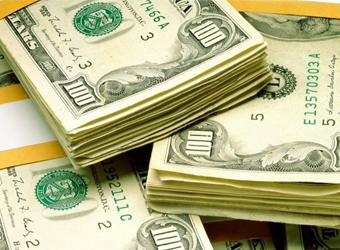The dollar drifted on Thursday as impact from the Federal Reserve’s policy meeting minutes and supportive comments from a top U.S. official faded, while the Australian dollar slipped in the wake of downbeat economic data.
The greenback was little changed at 113.300 yen.
The U.S. currency fell to a low of 112.905 yen overnight following the release of the Fed’s meeting minutes.
It pulled back to a high of 113.460 early on Thursday after U.S. Treasury Secretary Steven Mnuchin reportedly reiterated that a strong dollar was a good thing in the long run.
The dollar index against a basket of six major currencies inched up 0.1 percent to 101.340 after falling by roughly the same amount the previous day.
It had moved between a one-week high of 101.720 and a low of 101.170 on Wednesday.
“I think Mnuchin’s comments are neutral for the market overall,” said Masashi Murata, senior currency strategist at Brown Brothers Harriman in Tokyo.
“Their impact appears to have faded as he had already expressed such views before. We have to remember Mnuchin was referring to the dollar’s long-term prospects, and that he did suggest before that too strong of a dollar could have negative effects in the short-term,” he added.
The minutes from the January 31-February 1 Federal Open Market Committee (FOMC) meeting was a mixed bag for currencies as while policymakers were not as hawkish as some had hoped, their views still kept the prospect of a March interest rate hike in play.
The FOMC minutes noted many policymakers saying it may be appropriate to raise interest rates again fairly soon should jobs and inflation data come in line with expectations.
This initially disappointed dollar bulls, who had hoped for a more hawkish tone after Fed Chair Janet Yellen said last week that waiting too long to raise rates again would be unwise.
The greenback also sagged as policymakers mentioned the downside economic consequences of a stronger dollar.
“Of chief interest to the market right now is whether the Fed can still raise rates in March, and the meeting minutes did not suggest that a hike next month is no longer a possibility,” said Junichi Ishikawa, senior forex strategist at IG Securities in Tokyo.
A relatively big mover in Asia was the Australian dollar, which was last down 0.4 percent at $0.7676. The Aussie took a knock after data showed
Australia’s capital spending fell at a greater pace than anticipated in the fourth quarter.
The Australian dollar has enjoyed steady gains this year on country’s relatively high yields and the rise in the price of iron ore and had hit a three-month high of $0.7732 a week ago.
The euro was effectively flat at $1.0556, having pulled back from a 1-1/2-month low of $1.0494 plumbed the previous day.
The common currency bounced back overnight as the perceived chances of a French presidential election win by anti-European Union candidate Marine Le Pen took a slight dip.
The possibility of Le Pen winning and potentially negative consequences for the euro zone have recently dogged the euro.
Veteran French centrist Francois Bayrou said on Wednesday he was offering an alliance with independent candidate Emmanuel Macron, a move that could give the former investment banker a much-needed boost to reach the runoff in May’s presidential election.
Sterling was little changed at $1.2447 after falling on Wednesday as data showed UK business investment fell in the fourth quarter of 2016, indicating tougher economic times lie ahead.
Source: Reuters
